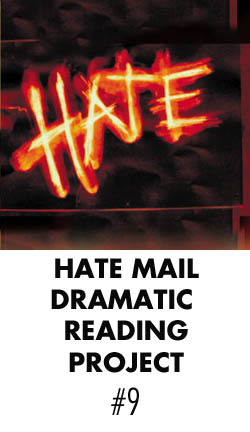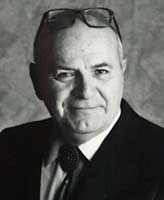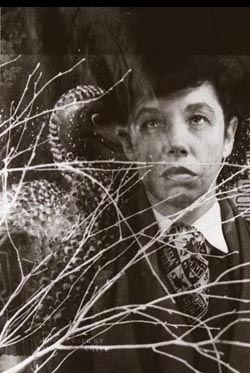Author / Edward Champion
“We Don’t Say That in America”

Hate Mail Dramatic Reading Project #9
 A few days ago, a writer emailed me, hoping to be on The Bat Segundo Show. I responded quite politely, as I do with all those who pitch me directly — pointing out that the show was heavily booked. But if he wanted to send me his book for consideration, he was more than happy to. However, due to the fact that I receive more books than I can possibly read, I couldn’t promise anything. He responded.
A few days ago, a writer emailed me, hoping to be on The Bat Segundo Show. I responded quite politely, as I do with all those who pitch me directly — pointing out that the show was heavily booked. But if he wanted to send me his book for consideration, he was more than happy to. However, due to the fact that I receive more books than I can possibly read, I couldn’t promise anything. He responded.
Therefore, my audio series — Hate Mail Dramatic Reading Project — must continue.
The following clip represents my dramatic reading of the hate mail in question, read in the style of a Tennessee Williams protagonist.
While I realize the project has stagnated of late, I assure you that it is ongoing. I plan to continue reading more hate mail. Again, I will be happy to read any specific hate mail that you’ve received. (If you do send me hate mail for potential dramatic readings, I only ask that you redact the names of the individuals.)
Click any of the below links to listen.
Hate Mail Dramatic Reading Project #9 (Download MP3)
Previous Hate Mail Dramatic Reading Installments:
#8 A hate mail read in the style of Jimmy Stewart
#7 A hate mail read in the style of Glenn Beck
#6 A hate mail read in the style of a Miss Manners schoolmarmish tone
#5 A hate mail read in the style of Richard Milhous Nixon
#4: A hate mail read in the style of a drunken Irishman.
#3: A hate mail read in the style of a quiet sociopath
#2: A hate mail read in a muted Peter Lorre impression
#1: A hate mail read in a melodramatic, quasi-Shakespearean style
Listen: Play in new window | Download

The Dead Writer’s Almanac: Clifton Hillegass
The Almanac’s staff has long wondered why Cinco de Mayo doesn’t get the proper respect it deserves. You see, a little more than a century and a half ago, 545 people died during the Battle of Puebla. The Mexican Army secured an unexpected victory against Napoleon’s forces, in large part because General Charles de Lorencez was arrogant enough to believe that the villagers would be sympathetic to the French military. Which is a bit like believing that a rape victim and her attacker will become BFF mere minutes after the brutal penetration.
545 dead bodies! Now that’s a death day to celebrate! But ask any fratboy guzzling down multitudinous margaritas about any of this, and he will intimate to you that Cinco de Mayo is the Mexican answer to St. Patrick’s Day. Then he will attempt to persuade you of his Hispanic roots (much as he attempted to persuade you of his Irish heritage only two months before), before swiftly abandoning the conversation (too intellectual, he may claim) so that he may scan the bar for a fetching mamacita before going home to an onanist’s bed.
Thus, Cinco de Mayo’s original celebratory purpose — founded upon war and death — has been transformed into a needlessly derivative holiday.
 So it seems only fitting to celebrate the man who created and published Cliffs Notes — arguably the most derivative series of study guides ever printed. Yes, it’s the death day of Clifton Hillegass, who passed away nine years ago today on May 5, 2001. He died at his home in Lincoln, Nebraska. The cause: complications after a stroke.
So it seems only fitting to celebrate the man who created and published Cliffs Notes — arguably the most derivative series of study guides ever printed. Yes, it’s the death day of Clifton Hillegass, who passed away nine years ago today on May 5, 2001. He died at his home in Lincoln, Nebraska. The cause: complications after a stroke.
Hillegass published study guides which ensured that high school and college literature students were entitled to fake it, even if he didn’t quite believe that these were the reasons why young kids scarfed up his striped handbooks. Or did he? This seems a suspicious stance from a man who started off as an Army Air Corps meteorologist, a man who was accustomed in his early career to predicting things. But he profited quite well on American procrastination. In 1958, while managing a wholesale department, he founded his company in a basement with a $4,000 loan, starting by reprinting summaries of sixteen Shakespeare plays from a Toronto publisher. The publisher was a guy named Jack Cole. Why did the apostrophe in “Cliff’s Notes” disappear? Well, Hillegass broke off ties with Cole, striking it out on his own. Hence, the name “Cliffs Notes” — a suitably ungrammatical concession to the enterprise. In 1999, Hillegass sold his company to IDG for a cool $14 million.
Hillegass was described by one employee as “a very intellectual individual,” and enjoyed mysteries and and the classics. In a New York Times obituary, Hillegass’s daughter claimed that her father “just basically wanted to help them get as much out of their education as they could.”
The inside covers of these bright yellow guides include the sentence: “A thorough appreciation of literature allows no short cuts.” But when a bookstore customer asks for Angry Raisins instead of The Grapes of Wrath, as this overview reveals, one must consider the full extent of Hillegass’s complicity. In a 2007 interview, CliffsNotes shipping employee John Shank revealed that Hillegass (and consulting editor James L. Roberts) “were pretty comfortable that they were being used for what they were intended for, back in the 1950’s and early 1960’s.”
Or were they more comfortable with the company’s success? It’s difficult to say. Hillegass’s recent death has produced a great hagiographical response from the people who knew and worked with Cliff. But to be fair to Hillegass, perhaps he can’t be entirely blamed for those who preferred to avoid reading literature, any more than the fratboy can be blamed for forgetting the Mexican Army. An uncommitted student will remain without dedication to the task at hand, even when his sweaty palms rely on a yellow veneer that the teacher has already obtained. If it hadn’t been Hillegass, it would have been somebody else. And if the dipsomaniac wasn’t drawn to Cinco de Mayo, it would be some other occasion. (It’s just too bad that nobody thinks to get inebriated on Arbor Day.)
Stay writing, don’t die too early, and keep in touch!

The Dead Writer’s Almanac: Jane Bowles
 It has been suggested by at least one prominent mortician that the Almanac’s staff has been dead for the past week. Well, the moribund undertaker in question was partially correct. Hans Campbell, our lead researcher, passed away on April 30, 2010, the victim of an unanticipated embolism experienced while putting together that day’s entry. He died at his desk — the way that any good researcher should. And it isn’t every day that you can claim to shake hands with a man who has the bad luck to die on the same day that Hitler blew his brains out (sixty-five years ago, if you’re as interested in the math as we are!). We here at the Almanac promise to not fuck around with a Walther PPK on a shooting range. We have given our small supply of cyanide tablets to a frenemy’s great aunt. So let the similarities between Hitler and Hans (or “HC,” as we nicknamed him in the office) end here. However, should anyone wish to make a Downfall video in HC’s honor, we suspect that his family will be greatly touched.
It has been suggested by at least one prominent mortician that the Almanac’s staff has been dead for the past week. Well, the moribund undertaker in question was partially correct. Hans Campbell, our lead researcher, passed away on April 30, 2010, the victim of an unanticipated embolism experienced while putting together that day’s entry. He died at his desk — the way that any good researcher should. And it isn’t every day that you can claim to shake hands with a man who has the bad luck to die on the same day that Hitler blew his brains out (sixty-five years ago, if you’re as interested in the math as we are!). We here at the Almanac promise to not fuck around with a Walther PPK on a shooting range. We have given our small supply of cyanide tablets to a frenemy’s great aunt. So let the similarities between Hitler and Hans (or “HC,” as we nicknamed him in the office) end here. However, should anyone wish to make a Downfall video in HC’s honor, we suspect that his family will be greatly touched.
Now that we’ve got that little bit of housekeeping out of the way, we’re pleased to announce that it’s the death day of Jane Bowles, who passed away thirty-seven years ago on May 4, 1973. You may know Jane as the wife of Paul Bowles (who remains dead, at least as far as we know). What you may not know is that Jane herself was also a writer; indeed, a very good one. A novel, a play, half a dozen short stories, and a partridge in a pear tree. As Stacy D’Erasmo noted in the May 1999 issue of Out, she was one of the great, underrated writers of the 20th century. D’Erasmo compared Bowles to Gertrude Stein and Djuna Barnes, writing of the “disjunctive, inchoate, sometimes emotionally violent connections between her characters, particularly her quasi-maniacal ‘spinster’ women.” John Ashbery called Bowles “a writer’s writer. Few literary reputations are as glamorous as the underground one she enjoyed she has enjoyed since her novel, Two Serious Ladies, was published in 1943.” But when Ashbery wrote these words (writing about her Collected Stories on January 29, 1967, in the New York Times Book Review, in the days when it was less shallow than it is now, when it still permitted poets to write thoughtful essays), he remarked that Two Serious Ladies had long gone out-of-print. This was something of a surprise, considering that Alice B. Toklas and Tennessee Williams had talked it up. Aside from featuring an original prose style, the novel did, after all, feature violence.
Bowles was born with the name “Jane Auer” in 1917. To the best of our knowledge, she did not contend with any crazy women in an attic. But she did prefer women. At the age of 20, she met her husband Paul — a man who was interested in both men and women. At the time, Paul was a composer. And when Jane began experiencing some success, in true competitive style, Paul himself was inspired to take up the pen. But when Paul found greater success as a writer, producing work much faster than Jane could, Jane grew extremely frustrated. For she worked much slower and with considerable care. According to numerous sources, she often claimed to be dying of writer’s block.
But despite these problems (which weren’t helped by the Bowles’s frequent run-ins with notable literary people), she maintained a graceful wit. Allen Ginsberg once asked Jane if she believed in God. “Well,” replied Jane, “if I do I’m certainly not discussing it on the telephone.”
Jane hasn’t received nearly as much attention as her husband. Even the New York Times, demonstrating its commitment to overlooking literary innovators, waited nearly a month before printing her obituary on May 31, 1973. And according to Virginia Spencer Carr’s Paul Bowles: A Life, even her gravestone was unmarked. As John Hopkins was to note in Tangier Diaries, Jane’s gravestone had transformed into “a refuse dump of broken flower pots and bottles and dead stalks cast aside by the assiduous ladies in black.” This was twenty-three months after her demise.
Perhaps in death, Jane Bowles might find a new life.
Stay writing, don’t die too early, and keep in touch!